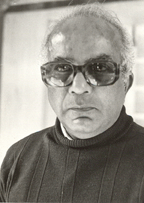 People's Democracy
People's Democracy
(Weekly
Organ of the Communist Party of India (Marxist)
No. 27
July 03, 2005
(Weekly
Organ of the Communist Party of India (Marxist)
|
Vol.
XXIX
No. 27 July 03, 2005 |

Following
excerpt is from an article “Trying
Times…Birth of PD” by Comrade Ramdass that appeared in People’s
Democracy, June 23, 1985.
RIGHT
from the time of the arrests, the need was felt for a central Party organ to
educate the Party on the Programme that had been adopted, to carry forward the
implementation of the Party line as laid down at the Seventh Congress, to
reflect the mass struggles that were breaking out, to make the experiences of
various states the common property of the Party, and above all, to combat the
lies and slanders of both the Congress government and the Right revisionists. In
1962-63 itself, when the leadership was in jail, we had started some language
weeklies-Deshhitaishi in Bengali, Chinta in Malayalam, Theekkathir
in Tamil and Lok Lahar, had also been started, but it ceased publication
after the 1964 arrests. But now, there was a dire need for a central English
weekly which could reach all states and even abroad. Some of the leaders inside
jail were not confident that we would be able either to produce a weekly or
ensure its circulation. Their advice was, to be satisfied with a cyclostyled
bulletin.
When
I met Comrade EMS and Jyoti Basu in Kerala in February, after reviewing the
post-arrest situation, it was decided to call a meeting of the CCMs who had
escaped arrest and were working underground, and four or five other comrades, in
March.
The
mid-term elections in Kerala were a revealing experience. Comrade EMS and Jyoti
Basu were the only leading campaigners for the Party. Most of candidates of the
party were in detention and had filed their nomination papers from inside jails.
There were no central finances for the campaign. This situation itself unleashed
mass local initiative. In every constituency, in every booth, local comrades
took the initiative, collected money, held rallies, approached the voters and
set up the election machinery.
The
Party came out with a thumping victory-emerging as the single largest party,
with over forty seats-twenty nine of the victorious candidates were detenus. The
CPI which put up around seventy candidates, won just three seats and lost
security deposits in most of the others. The only other election held around
that time was to the Behala Municipal Council on May 30, in which the Congress
was reduced to a minority of twelve out of twenty five members, the united
Progressive Association of which the CPI(M) was the main constituent, winning
the remaining thirteen seats.
It
was clear that the bulk of the mass base of the undivided CPI in Kerala had
rallied to the CPI(M). It also made clear that unless the tens of thousands of
comrades who had evinced such a wonderful initiative during the election
campaign in Kerala, and in other activities elsewhere, were moulded with the
understanding of the Seventh Congress, the Party would soon face difficult
situations. This again underlined the urgency of bringing out a central English
journal.
The
meeting in March, as earlier decided upon, was held secretly in Calcutta. It
coopted some new members to the CC, decided to set up the central office in
Calcutta and to bring out the English weekly from there. It was also decided
that the Hindi Weekly Swadhinata, which was the journal of the West
Bengal state committee, would be converted into a central organ. Calcutta was
chosen because the office of the West Bengal state committee and its press were
in the hands of the CPI(M), and the central office would be able to get the
guidance of comrade Jyoti Basu all the time, and whenever necessary of Comrade
EMS also.
PD IS BORN
The first task was to set up a machinery to bring out the paper. Some comrades with the necessary technical experience had to be there to sit in the open office and do the presswork. The late comrade Amar Mukherjee was assigned this job and a managerial team was also put together. The West Bengal comrades also gave two college lecturers to write on international affairs for PD. Comrade M K Pandhe joined us some time later and Comrade Chari did typing and accounting, along with some other jobs.
But
there was a bigger problem the entire material which reached the open office had
to be sent to us who were working underground, the reports had to be rewritten,
articles and editorials had to be written and they had to be sent back to the
open office. Comrade Jyoti Basu, most of the time, used to see the editorials
and articles before they were given for composing. This apparatus also was set
up, and it worked well during the entire period without any blow-up.
The
next main job was to organise the circulation, at least in the major states and
cities to begin with. I went to the major states again for this purpose and
ended up in Trivandrum. Comrade EMS was informed of all that had been done. And
in Trivandrum the last problem also was solved. Comrade EMS gave Rs 5000 from
the Kerala state committee to start the production of the paper. Of this Rs 2000
was given to the press to buy some more English types (the composing was being
done by hand) and the remaining Rs 3000 was kept for purchase of newsprint,
postage, etc. This was the very modest beginning of People’s Democracy
in the most difficult conditions.